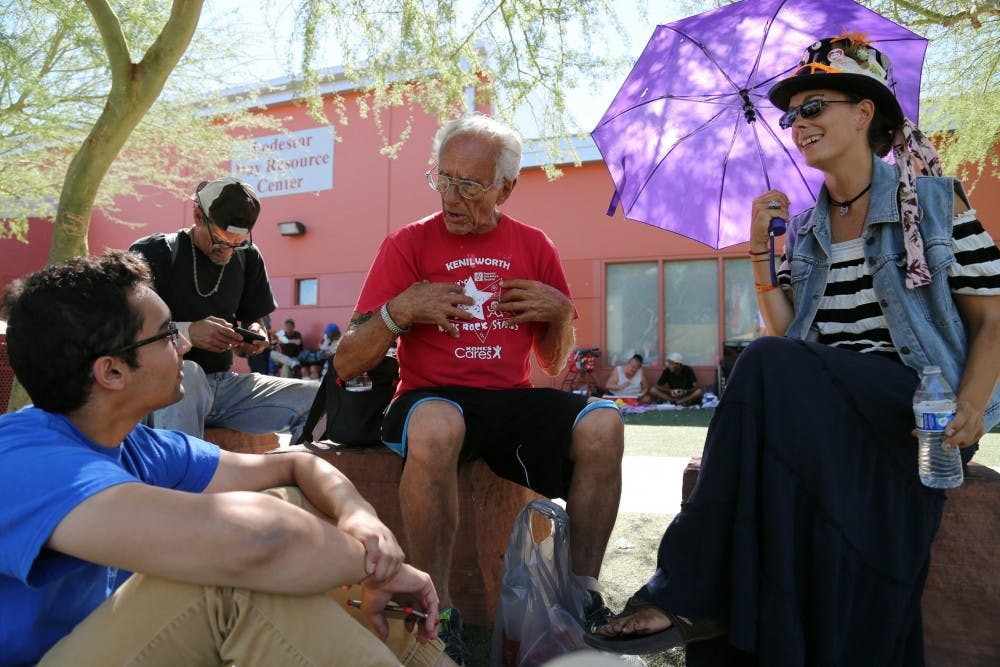It’s not uncommon to pass homeless individuals on the streets of Phoenix or see them converging around the city’s Human Services campus.
Alongside their sleeping packs, they carry the label of "homeless person" and are avoided at street corners, but are rarely ever asked their stories.
A group of volunteers from around the community are using social media and human interaction to change that.
The Student Health Outreach for Wellness Clinic, or SHOW, is a student-run clinic offering care for those facing homelessness. It has participants from ASU, Northern Arizona University and University of Arizona.
While the volunteers work to treat the homeless medically, Maggie Delaney, a third year physical therapy doctoral student at NAU, said she wanted to go a step further and tell the stories of the people she was treating.
Delaney said she pitched the idea of Humans of SHOW after hearing negative remarks about the homeless population.
“I heard a health care provider who was kind of making some remarks about treating the homeless population, kind of insinuating that they didn’t really deserve free or above and beyond care from providers because they weren’t a 'functional or valued member of society’,” she said. “I felt like that was wrong and sad to hear.”
Delaney said she drew inspiration from a similar project, Humans of New York, to dismantle the stereotypes around the homeless by allowing people to read their stories, listen to recorded interviews or see pictures of their situation.
“That could be the person you see on the side of the highway or hear someone make a remark about, but if you put that story with them, you wouldn’t be as quick to judge,” she said. “It’s allowing them to have more complexity than just this surface level idea of homelessness that I think most of society holds.”
Delaney said the project has given the homeless a platform to not only share personal experiences, but to give their opinion on the system that's meant to support them.
“We didn’t want to exploit anyone, we truly wanted people who wanted to get their voice out there,” she said. “They had thoughts and opinions, especially on the system and resources for the homeless.”
Delaney said this project has given her a new perspective on homeless individuals.
“There’s so many different reasons that folks end up homeless, and there really isn’t one direct path that lands that you there,” she said. “Homelessness is not a definition, it’s a circumstance.”
Kelsey Flood, an ASU alumna and UA master's student in nursing, was recruited by Delaney to capture the visuals for this project.
Flood took the opportunity as a photographer to challenge people to understand the homeless.
“I think they are an incredibly misunderstood group of individuals and I think that this project directly faces the idea of the similarities of human kind,” she said.
Flood said the visual element forced people to make a connection with those featured in the project.
“I know in my life I have been sheepish with eye contact when it comes to connecting with individuals on the street that may be experiencing homelessness, but the idea was to make unguarded eye contact,” she said. “Face-to-face presentation is something we engage in with our friends and family, but to be able to do that with an individual we might not converse with regularly is so strong.”
Flood said the nerves she felt when starting this project were completely relieved by the warmth and openness of those she interviewed.
“Most humans enjoy conversation, so that I think was enjoyable for both parties, but I feel that the disclosure of their stories was more of a gift,” she said. “It was a choice for them to be open when they really didn’t have reason to be.”
By taking pictures and collecting these stories, Flood said she found that all people — regardless of their situation — desire the same things.
“We all care about families, have goals, need comfort and engage in humor,” she said. “Whether you have a loud floor on top of you, or you’re sleeping on a bench, it bothers all of us when we have shortcomings of comfort.”
Chandan Saini, a senior ASU psychology major, volunteers at the clinic every Saturday.
Saini said he has created connections and friendships with those he talks to, and he often sees the same people around the clinic.
“Before, I was one of those people who had negative preconceived notions about them, but I got involved in this project to get out of my comfort zone,” he said. “Now it’s more often that they just can’t stop talking.”
Saini said he’s aware of the way homeless people are viewed, but has been able learn who they are on a deeper level.
“They’re loving people and people shouldn’t be afraid to talk to them,” he said.
Reach the reporter at kasando1@asu.edu or follow @karismasandoval onTwitter.
Like The State Press on Facebook and follow @statepress on Twitter.




